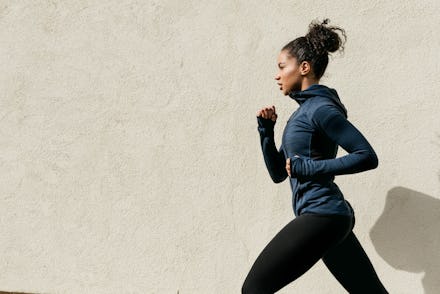Niche fitness classes reign but I still want to work out alone

In the past, gyms were giant warehouses of fitness where you could do everything from weight-lifting to yoga. Now, boutique gyms are popping up everywhere that focus on one kind of exercise. They’re culty, they sometimes tantalize with promises of weight loss and rapid gains, and they want our money. Ultimately, all of us exercise because it makes us feel good, mentally and emotionally. The uptick in niche gyms use research touting the benefits of group workouts, but for many of us, exercising is meditative and restorative — and that restoration needs to come when we’re totally and completely alone. I talked to one of my favorite psychologists to find out whether exercising alone has mental health benefits.
I have been running alone at sunrise for over 20 years. At first, it was out of embarrassment; I was out of shape and I wanted to get fit without an audience. But the habit has stuck. Even though I am now a bonafide fitness professional (I have been a yoga teacher for almost 15 years), I still prefer to do all my exercise alone: yoga, running, going to the gym, and skating. It’s helped me learn to find an internal locus of control. I have to be intimately connected to my own body to ascertain how much to push myself.
I sometimes feel like an outlier though, because people are always saying that working out in groups is better. It helps them stay motivated — kind of like how you might study for a test with more focus if you’re in the library with other people studying versus, say, your bedroom. But that’s other-centered motivation, which isn’t always as empowering as it seems.
“When you work out for yourself instead of for others, you're treating yourself with respect,” says Aimee Daramus, a Chicago-based psychotherapist. “Being thin is often something we do for other people, while strength, speed, and the mental benefits of exercise are often things we do for ourselves.” When you exercise alone, you have to figure out what your body wants from the inside out because there’s no basis for comparison.
Also, exercising alone has taught me a lot about the joy of solitude. Because I have run alone for such a long period of time, I have come to associate being alone with the feel-good chemicals that exercise releases in the body. When I run, there is no sense of loneliness. I am alone with endorphins and I get to focus on them. “That's basic classical conditioning,” Daramus explains, when I share my solo-running manifesto with her. She doesn’t mean physical conditioning, but psychological. “You're associating something that feels good and releases powerful chemicals with being alone.” Eventually, that association made me comfortable doing other things solo as well — like watching movies or going out to dinner.
And here’s the thing about exercise and mental illness that gym-pushers don’t get: Sometimes, exercise can help immensely, and for someone with anxiety or depression, being around a lot of people is a huge deterrent. “There have been studies on depression, showing that some people get positive results from running that equal those of antidepressants,” says Daramus. “Exercise releases endorphins, very mild painkillers produced by the body that also give you a mood lift. It also releases dopamine, norepinephrine, and serotonin, all of which are also components in antidepressant medications,” she explains. Everyone deserves these natural uppers, even if they don’t want to see another human while doing it.
There are some downsides to exercising alone, of course. Sometimes I don’t push myself as hard as I know I could. Daramus has some motivation hacks for folks who want to push their limits alone. “Figure out what you really want and set goals,” she says. “Make sure you educate yourself. If you can, get a few sessions with a personal trainer to teach you what good form feels like.” Also, being a solo workout junkie doesn’t mean you have to work out alone all the time. Daramus suggests using events, like marathons or meet-ups, as ways to keep yourself working towards a goal.
Exercising alone, inarguably, gives you a sense of intrinsic reward: the feeling you get when you’re motivated by your internal satisfaction instead of a compliment or accolade from another. People who place higher emphasis on intrinsic rewards rather than external ones tend to have a higher sense of self-esteem. “So many of us spend our lives pleasing our families and then teachers, bosses, and the IRS, that it can be an incredible relief to get in touch with what you actually want for yourself,” says Daramus.